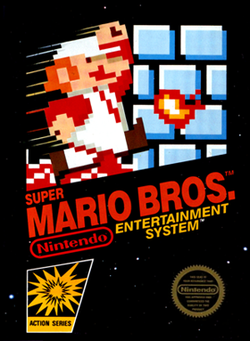 First thing's first. I don't want to write this blog post. I really, truly do not want to do it. I know I have to finish what I started, and trust me, there have been plenty of times throughout the year that I couldn't wait for this day to finally happen. There were days I just wanted to quit the whole project. But there were also days I just pictured carrying on past today into the future, continuing on a wild journey of game playing and writing, with no end date or goal in sight, just because I didn't want it all to come to an end. But it has to end. The end is here. All good things come to an end. You know, all those cliche statements about things ending probably apply here as well. I don't want to spend this entire blog post reflecting on the year, because more of that to come after this year is over. For now though, for the sake of my sanity and emotions that are bubbling over at this point, and for the sake of you all, the readers, I want to finish the year the way I started this year, and what I tried to make every day about ultimately, regardless of outside circumstances or more important events. This blog post, the final one in My Year of Gaming, needs to be about a video game, just like every other one. That's what this whole project is about in the first place, right? So with that, I want to cap off my Super Mario series, and finish off the year, with not only one of the most important and influential video games of all time (especially the Mario franchise), but the single most important, memorable and influential video game for me, Josh Brown: writer, gamer, kid at heart. Of course I'm talking about Super Mario Bros., as if the title of the blog post or the huge box art graphic wasn't enough of a spoiler for you all, like you're sitting there waiting patiently for me to unveil the final game of the blog project. Super Mario Bros. is the first video game I ever played. Well, to be fair, it is the first video game I remember playing, as I know there was an Atari in the house before I got my NES for Christmas one year, which was either 1986 or 1987. All those early years of my life kind of blend together, but I remember being really young. So whether or not I was playing any of those Atari games before I got my NES is irrelevant, because it wasn't until Super Mario Bros. that I actually acknowledged and understood that I was playing a video game. And oh what a game it was. I played Super Mario Bros. non-stop, it felt like. As a kid, new to this whole video game thing, I was still trying to work out the kinks of my hand/eye coordination, but I never let my inadequacies keep me from playing more, practicing more, and striving to rescue the princess. Finding the castle where the princess was being held hostage felt like my only goal in life, as every time I felt like I was there, that stupid little guy with a mushroom on his head would tell me "Thank you Mario! But our princess is in another castle!" Of course, not having any other video games to relate to, I wasn't totally in-tune with the concept of a final, epic boss battle, so I had no idea what to look for or expect to find when and if it ever happened. I would just beat a castle, thinking I won, only to find out I had to keep going on to a different looking set of levels. There was a point, I remember distinctly, where I thought the game would just go on forever. Oh, how naive I was back then. When I finally beat the game and saved the princess, I remember how awesome I felt. I went and bragged to everyone. I showed my parents, I showed my grandparents, I showed and helped all my friends who hadn't beaten it yet, and I showed anyone who would let me, whether they cared about it or not. I was so proud of myself, as I should be at that age, and I will forever hold on to and remember that feeling. I've completed and beaten countless game since that first one, and while some spur feelings of pride and accomplishment, none have ever felt like it did when I beat Super Mario Bros. for the very first time. Another thing I remember distinctly was a babysitter I had at some point after my big accomplishment, who showed and taught me how to "rock the turtle," or whatever else you may know it as, when you jump on the turtle coming down the staircase at just the right time. If you time it perfectly, Mario will land back on the turtle shell bouncing off the side of the step with every hop, essentially performing countless, endless jumps without touching the controller, racking up 1-Ups every time you land on the turtle shell, giving you a seemingly infinite amount of lives. This was the very first time I was consciously aware that you could technically cheat in a video game, and break the established rules of the video game for your own personal gain. This is where the thing I enjoyed playing turned into something more real, more technical, and while I still didn't fully understand how video games worked or what went into making them, I did understand that they were more than just what you saw on the television screen. Over the 26+ years I've been playing video games, I have never beaten any game more than Super Mario Bros. Actually, I have never bought a video game more times than I have Super Mario Bros, as every platform it is released on, I pick up immediately. Sure, for the most part, it is just for nostalgic purposes, but I truly still enjoy playing the game, over and over again, trying to beat the game each time I pick it up. Sometimes I warp, sometimes I run through straight, but every time I try to Rock the Turtle on my way to saving the princess. Occasionally I will feel inspired enough to play through a second time, with the Goombas and Koopas all turned into those annoying hard-shelled creatures, which probably have names, but I can't seem to remember. Other times I'll just call it good with saving the princess the first time, sitting back and reminiscing on beating the game just like I did all those years ago as a child, so naive, so young, so innocent. I never, ever could have imagined that all that time put into one video game as a kid would ever lead to something, and while it is debatable whether or not this year-long project constitutes as "something," I still feel it makes sense that Super Mario Bros. is the last game I will play, write about and reflect upon in My Year of Gaming. It's only fitting that this is the last screen I will see, as well: The only question that remains now is, whether or not I press the B button ... or drop the controller and turn off the system...
-The End... ?
1 Comment
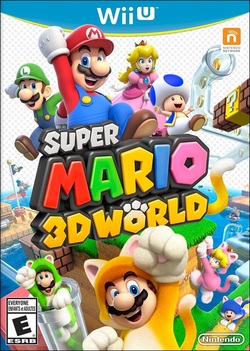 Finally. The Mario game all fans have been waiting for. Super Mario 3D World, for the Wii U, came out last month, and honestly, I haven't stopped playing it since I first got it. It actually was released on the same day as the Xbox One, and as excited as I was for the new console and all the cool new games for it, the only game I really cared about that day was Super Mario 3D World. In fact, after playing so many games all year, new and old, this game was the perfect combination of old and new, and quite frankly, has been at the top of my list for Game of the Year since the first level I played. I could literally go on and on about how and why this game is so amazing, and while it might make for a great blog post, it just won't do the game any justice. It literally is the perfect Mario game, which is why I am so excited for it to be apart of My Year of Gaming, and to help wrap up My 12 Days of Super Mario series, which essentially is closing out the year for me. Instead of gushing over the game for thousands of words, however, I'm going to just do what my friend suggested I do for this post, and wrap up the entire game in two simple words... Cat Suit. 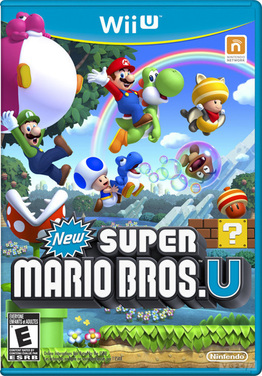 It had been a long time since Nintendo relied on Mario to help sell a system right out of the gate. Over the years, he has been called in to action when the timing was right, or when sales were slumping, or even just to fill a void between Nintendo-published, first party games. But Mario as a launch title? You would have to go all the way back to the Nintendo 64 system launch, when Super Mario 64 was a launch title. Of course back then, it was routine for Nintendo to launch a system with it's most recognizable mascot available with it or an addition to on day one, starting with Super Mario Bros. included with the NES and Super Mario World with the SNES. After Mario 64, however, which wasn't included with the system but available to buy separately, Mario wasn't seen on launch for any of Nintendo's consoles. Was this because they had a plethora of first party franchises to call upon for launches, or did they just want to make Mario bigger and better than just the launch day title of each generation? What the case was, it would be 16 years before a Mario game was launched with a new Nintendo console. That console was the new Wii U, and the game was New Super Mario Bros. U. That's right, not only did Nintendo welcome it's new console with a Mario game, but it plucked it right from the "New" series of Mario games, which effectively made it the second platforming Mario game in a row to share the style and namesake. For one, I have to believe that Nintendo worried about the Wii U from before launch, as it would be the only reason to explain launching with a Mario game after being so stubborn about that notion for so long. Of course, they had plenty of reasons to be concerned for the Wii U right out of the gate, as they did a poor job marketing the new system as a new system from the get-go. The general public had no idea it was a brand new console, and not just an add-on to the existing Wii console that everyone had in their living rooms. The messaging is starting to get better now, little by little, but honestly, I still run in to people who think the GamePad controller/tablet is just a new peripheral for the old Wii console. Is it the name of the console, the lack of proper marketing, or just general apathy about Nintendo as a whole? I don't have concrete answers, but I'm sure a little of each plays a part in the struggles of the Wii U. Also, I'm pretty confident that developing a "New" style of Mario game has to be easier and quicker than any 3D type of Mario game, or a brand new style of Mario game, which is why Nintendo can call upon on it when needed. Now, I'm not saying this is just a cut-and-paste development cycle for this game, and not saying it was super easy and required little to no work, but overall, it has to be easier than other types of Mario games. It's important to remember that this is the very first Mario game developed in HD, for an HD system, so it wasn't just the same old "New" game rehashed for the new system. Even Nintendo came out and admitted that developing for an HD system was actually more difficult than they anticipated, which might explain why is this the style of Mario they chose to go with for launch day. In fact, this game was originally shown off as a tech demo for the new system early on in the revealing of the Wii U, as it was dubbed New Super Mario Bros. Mii. It showcased being able to play as your Mii character running through familiar Mushroom Kingdom style levels, and didn't really show off too much of a new game as it did what the GamePad could offer and what a Mario game would look like in HD. Somewhere along the way, however, they changed up their plan and turned that tech demo into an actual game, changing the name and focus of the game as well. I'm really curious what triggered that decision - was it out of desperation to launch with a Mario game or out of frustrations from trying to develop a new Mario game for an HD system? Or were they just taking the same approach with this title as they did New Super Mario Bros. Wii, trying to bring the family together on the couch, this time with a fifth player, while still showing off how the GamePad can add different gameplay styles to games? Whatever the process was or reasons for the decisions that were made, day one adopters of the Wii U were given the chance to take home a Mario game with their new system. And whatever troubles or problems they may have encountered along the way, the final product was refreshing and amazingly gorgeous. It was the first game I put into my Wii U, and from the loading screen, I could immediately tell how awesome Mario looked in HD. Finally, after so many years of perfecting the look of Mario, and making him look his absolute best with the capabilities available, Mario was now officially in HD. It was about time. Every second of that game is beautiful and makes you smile, as it runs flawlessly and smooth, and just makes you feel good as a gamer. Playing on the GamePad is something Nintendo has banked on as being a major selling point for the system, and let me tell you, it is still great to be able to play a full console game right on the GamePad while watching something else on TV, or allowing someone else to use the TV for whatever else they choose. There is no lag, no drop in frame rate and despite not having the same graphics as your TV (presumably), the games played on it don't look distorted or lesser versions at all. They look great on the GamePad, which makes using it if need be still super enjoyable. New Super Mario Bros. U also features something new to the Mario franchise, adding a new challenge mode to the game, which gives you the chance to test your Mario platforming skills in ways you've never experienced before. There are a wide variety of challenges, and types of challenges to choose from, and the more you accomplish, the more you unlock, and essentially, the better of a player you feel like. The first couple of challenges of each group are pretty easy to nail, but the difficulty ramps up quickly, as I find myself stuck on several challenges, despite trying them over and over and over again. This adds replayability for sure, and is fun to watch other people try them as well, especially when they fail horribly and you suddenly don't feel like a worthless gamer. The game overall is just fun, plain and simple. I understand a lot of gamers and fans felt slightly cheated with this game being the Mario launch title they got, but honestly, it was by far the best launch game for the Wii U. That's not a slight to the launch line-up at all, as there were a handful of quality Wii U games available on day one, but out of all of them, Nintendo proved once again that nobody knows how to develop for Nintendo consoles better than Nintendo themselves. Even if it was just a place holder for the game they really wanted to release or not, New Super Mario Bros. U is easily the best addition to the "New" series by a long shot. 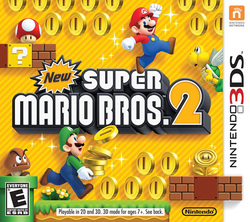 There have always been a few mysteries in the Mushroom Kingdom and the Mario game franchise, especially the Mario platformers, that have never really been answered, much less ever challenged. These things are always just accepted for being what they are, simply part of the game, and nothing else. Other game franchises can't even change the font of the logo without wild internet speculation running wild, but within the world of Mario, fans just take everything delivered to them at face value. Even other franchises that Nintendo has, like The Legend of Zelda, can't get away with anything without people freaking out and challenging them everything, as if everything in a game needs to be fully explained or make sense, because you know, they are more than video games, I guess. One long-standing mystery is the reason behind the point total in Mario games, as they have zero use at all, ever, but they continue to show up without explanation or reason. Another mystery, that has actually garnered some internet speculation, is why all the bad guys in Mario games seem completely content and happy until Mario comes along and jumps on them or antagonizes them in other ways? Is Mario really the bad guy in this whole scenario, and we've just been trolled this entire time by Nintendo? There might actually be something behind that notion, but that's actually not what I wanted to write about. You see, one other Mario staple that has never been discussed are all those gold coins thrown all over the place, laying around for Mario to grab, hiding in blocks waiting to be broken open and used as rewards for jobs completed. The only real purpose of the coins has always been to reward the player with an extra life once 100 coins are gathered, and that's it. So what's the deal with those coins? Where did they come from? What use are they to Mario other than the extra life? And over the course of a game, how many coins do you think you really collect, anyway? Well, with New Super Mario Bros. 2, the second 3DS Mario game to be released, some of those coin questions are answered. You see, aside from the normal quest to save the princess, the kingdom and the day, Mario is also on another mission, one never before seen in a Mario game before, which is exactly what makes this game unique and different than any other game in the "New" series, or the entire Mario franchise for that matter. Coins are the focus on the game, as there is an overall counter for how many coins are collected throughout the game, keeping a running total for you to admire. While it keeps track of every coin collected, there is a lot more to it, as every level is flooded with coins, multiplying the amount of coins to pick up tenfold compared to the normal amount in any other Mario game. The fact that there are coins everywhere makes it perfectly clear what this game is all about, and it's fun to see so much gold throughout the levels, almost making you forget that there are enemies or an end goal for each level. Seeing your total amount go up after every level is a treat as well, as you can fully comprehend just what kind of coin collector you are. There are even new power ups that are focused around giving you more coins than you could imagine. My favorite new power up is the gold fire flower, which lets you throw golden fire balls that turn whatever they touch into gold coins, like enemies and bricks. Stomping through a wall of bricks with giant Mario is always fun, but there is just something extremely more satisfying about turning a massive wall into a shower of gold coins with just a couple of thrown fireballs at it. In the grand scheme of things, however, the coins still don't mean anything. The more coins you add to your overall total, the more coins that appear on the title screen of the game, but other than that, the idea is flushed out very well. Nintendo imposed a challenge to gamers, questioning whether you could get to a million coins, which I initially ate up like the Nintendo fanboy I am. I was pretty set on reaching that goal, until I beat the game completely backwards and forwards and realized I wasn't even half-way there. Then reports started trickling in that reaching one million coins didn't unlock anything special or change the game in any way, which was all I needed to here to convince me to move on to other games at the time. Don't get me wrong, running through levels and collecting as many coins as possible is awesome fun, but when that turns into the only thing that you are doing, it becomes a whole lot less fun. Mario games have never been about grinding to achieve something, and I'm not about to turn a Mario game into that. Another thing that bugs me is how it completely wrecks me as a person and directly slaps my OCD tendencies in games in the face. I am a collector in games, and compulsively feel the need collect everything in games, and that goes double for coins in Mario games. I can't not collect a coin or two in a Mario level, sometimes going out of my way for every little coin, so when the entire level is filled with coins and so many of them are unattainable in the given time, it drives me crazy. It takes all the willpower I have within to play this game, and even after a while of not playing the game, I still find it hard to just ignore coins and try to grab every single one. One other thing that Nintendo tried with this game was their first foray into DLC for Mario, in which they offered up level packs for the Coin Rush Mode for a couple of dollars a pop. I think there was even a level or two for free, just to gauge interest, because let's face it, Nintendo has never really been big on the online front. Naturally, I had to throw a few bucks Nintendo's way for these DLC packs, which turned out to be exceptionally fun and worth the pocket change, as the levels they added were challenging, fun, exciting and a nice change of pace to the traditional Mario game play for sure. Everywhere you look in this game, you see gold, which adds such a different feel to the game, it almost doesn't seem fair to lump it in with the "New" series of Mario games, which only qualifies it for it because of the traditional 2D platforming and charming graphics. And while the self-imposed pressure to collect as many coins may not have charmed everyone as much as Nintendo would have liked, the New Super Mario Bros. series would prove to be a reliable formula for above-average Mario games. 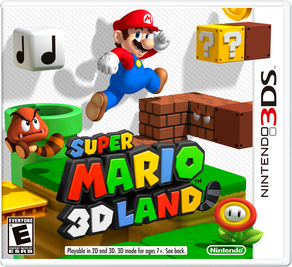 It's no secret, or shouldn't be at this point at least, that when the Nintendo 3DS was released, Nintendo made a crucial mistake by not launching with a strong line-up of games to go along with the brand new handheld system. Actually, having a decent selection of games on launch day would have been enough to garner some interest in the 3DS, but unfortunately, Nintendo banked on the system to sell itself just on the cool, new 3D technology and other innovations added to it. The company that prides itself in being all about the first party games failed to live up to their own standards, as the day one games were bleak and uninspiring, to say the least. Unless, of course, you're a fan of submarines. It also didn't help that at the same time the 3DS launched, Pokemon Black and White was released for the DS, which despite being backwards compatible, didn't help convince anyone to upgrade to the new system, when their older handheld systems were capable of playing the newest game(s) of one of the most popular and world-renowned gaming franchises of all time. I would bet it all that if Nintendo could do it again, they would make Pokemon Black and White 3DS games and use them as the maybe the biggest, most popular launch titles ever. But, hindsight is 20/20, as they say. Anyway, because of the weak launch line-up of games, the 3DS sold poorly out of the gate, and was actually being considered a failure early on, as the units just weren't moving off of store shelves. To keep rabid fans and critics at bay, they dug deep in their bag of goodies and pulled out the Legend of Zelda: Ocarina of Time 3D remake, seemingly out of nowhere, which kept early adopters of the system content if anything, just because they finally had a good Nintendo-published game to play. Unfortunately, the re-release of that game, despite how good it was and how great it looked on the 3D screen, didn't move the sales needle, as the system was still having a hard time selling. So Nintendo did what it had to do. Maybe it was the plan all along, but either way, the timing was crucial for the all-out assault it was about to unleash in an effort to push systems out the door and in the hands of eager Nintendo fans. Not only did they plan a price cut of the slightly over-priced system, but they also dipped in to two of their go-to franchises, Mario Kart and Super Mario. Super Mario 3D Land led the battle charge, with Kart following less than a month later, and immediately, gamers were finally given reason to own the 3DS system for themselves. Super Mario 3D Land took a bunch of concepts from past Mario games and mashed them together, all in hopes of showing off the new features that the 3DS had to offer to gaming. It played like the typical 2D side-scrolling Mario platformer, all the levels weren't just flat landscapes to run across, as 3D exploration of the world was essential. It wasn't quite a 2.5D type of game, but it wasn't a full 3D style of game like Galaxy or Mario 64. It was the perfect style of game for a handheld system that still beautifully showed off the benefits of the 3D effect, that critics were already calling a "gimmick." In fact, this was the very first 3DS game that I played entirely with the 3D slider bar pushed all the way up. Another fan-favorite move in their bag of tricks was the return of the Super Leaf power-up, giving Mario the ability to throw on the Tanooki suit and use that glorious Raccoon tail to his advantage. The Tanooki suit hadn't been seen or heard from since Super Mario Bros. 3, and before it was officially announced, it was merely a simple raccoon tail added to the logo first shown. Of course, Mario fans everywhere rejoiced, as the Super Leaf was always regarded highly by fans. Over the years, they gave Mario lots of other power-ups that allowed him to fly, float and attack enemies from close range, but never did they revisit the Super Leaf - until this game. And I tell you what, it was a pleasure to have it back. The game itself feels short at first, but after "beating" it, you realize just how much of the game there is to play, which was a nice swerve by the developers. I remember when I first played it, I say there thinking, "After all of this, that's it?", and then was pleasantly surprised by what transpired after that. It also showed off the 3DS system in all it's glory, which is what finally helped sell the system itself, utilizing the 3D effects beautifully, while also using the gyroscope efficiently, and taking advantage of the StreetPass function in a fun way that only a Mario game could get away with. Overall, this game was exactly what the 3DS needed when it was released, and has since go on to be the best selling game on the system. Currently, the 3DS is selling gangbusters and has proven to be the epitome of a success story for a gaming console, especially considering it's rough start. It was the perfect mash-up of Mario styles, and would eventually pave the way for a brand new type of Mario game to become a staple of the franchise. But before Nintendo would revisit the 2D/3D style that helped save the 3DS, they would finally do something many fans had been wondering forever, but never got any answers to. They would finally let Mario strive for something more than just rescuing the princess and defeating Bowser. 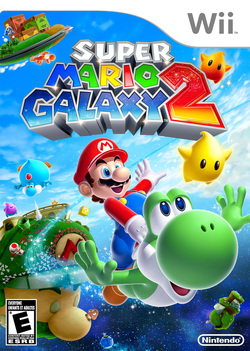 As I wrote before, Nintendo surprised everyone with New Super Mario Bros. Wii when they released it on the heels of Mario Galaxy, if only because everyone at that point was expecting Nintendo to 1-up themselves and expand on the Galaxy series they established, or at least continue with the 3D style of their next Mario game. But, as I so eloquently pointed out, Nintendo isn't one to cave to pressure, and continues to do things their way, whichever way they feel is best. I really do think that they were super happy with NSMBW and how it turned out, specifically how it finally encouraged players of all ages and skill levels to sit around on the couch and play a Mario game together, cooperatively, sharing the same gaming experience at once. Despite what they personally thought about the game, however, Nintendo decided to keep true to their philosophy about keeping things fresh and new, and decided not to make another game like NSMBW, instead, going back to their newest bread and butter for the Mario franchise. That's right, they took Mario back to outer space for another adventure within the cosmos, with a sequel to the best reviewed Mario game ever, simply titles Super Mario Galaxy 2. With the release of this game, Nintendo actually pulled back the curtain on the development cycle of this game, admitting that it was first being designed as an add-on or expansion type of game to the original Galaxy, tentatively to be titled "More Super Mario Galaxy." But apparently, once the development team got rolling on the title, they were inundated and flooded with dozens of new ideas for the game, everything from new levels, to gameplay mechanics, bosses and even power ups. It was then decided to make what they were creating into a full-fledged game and an outright sequel to the original game, which pushed development back another year and a half or so. Usually, this kind of decision can mean bad news for the title. First of all, when a title is delayed over a year or so, people freak out and usually sour on the title by the time it is released. With Nintendo being so tight-lipped about their development of games, however, nobody knew it was delayed as it was only ever shown off and previewed as Galaxy 2. Personally, I wish more companies would take this approach, as it would eliminate over-hyping a game and just allowing it to organically build momentum, and would actually prevent development teams from rushing their work and stop publishers from pushing out unfinished products for the sake of meeting deadlines. Think about it: how often does Nintendo ship out broken or buggy games that need countless patches after release? Hardly ever, as the only example I can think of is the crazy game breaking bug in Zelda: Skyward Sword, that was promptly fixed when noticed. Other than that, when Nintendo games are released, they are finished products. Crazy notion, right? Secondly, when studios try to create more from something small, it can get sketchy real quick. If a development team is told to take what is essentially DLC for an existing game and turn it into a full retail game, you better believe that game will be overflowing with filler content, and usually ends up feeling like a rip-off when looking at the what you get in the game compared to the price tag. For Nintendo to do this, they would have had to be absolutely certain they could transform all of their new ideas into a full game, or they wouldn't have ever pulled the trigger. Despite Nintendo liking money and doing what they can to make it, they always strive to deliver what they feel is an acceptable product for what they expect customers to pay for. So how did they do with Super Mario Galaxy 2? Well, they completely outdid themselves, creating yet another game that proudly sits near the very top of the all-time best highest review scores list on Metacritic. Not only that, but personally, playing Galaxy 2 doesn't ever feel like an expansion or DLC, but feels like a brand new game. Actually, it doesn't even feel like a full sequel to Galaxy, as there are so many new and different things in the game, it could have a completely title and not feel weird or out of place at all. Sure, it is in space like the original, but the game is so good, it deserves to had a stand-alone name, not be in the shadows of the first game. The biggest difference between this game and the first is the inclusion of Yoshi. Finally, after all these years, Yoshi is back in full form. He doesn't just feel like a power-up as he did in New Super Mario Bros. Wii, but rather an additional character, or partner if you will, to Mario on his adventure. He isn't in every level, and doesn't act like a companion character, but when you get him, especially his different versions, it adds a new and exciting wrinkle to the gameplay mechanics that couldn't be possible without the lovable dinosaur friend. Galaxy 2 also added an increased difficulty to the game, especially when playing additional and bonus levels, or going after those pesky green stars. While the difficulty could be nauseating and frustrating to some, I absolutely love replaying levels of this game over and over again in hopes of finally succeeding. In fact, I went back and attempted the hardest level possibly ever created for a Mario game, which I could never beat before. Well, after a few years of not touching it, I am proud to announce that ... I stilli can't beat the level, despite my best efforts and many lives spent. Oh well, maybe in a couple more years I'll give it a shot once again. Another thing I want to point out, which I honestly had forgotten about until playing it again, was how amazing the musical score for this game is. The first Galaxy game had fantastic music too, but in this game, there are points where you just want to put the controller down and listen to the music, letting the sound and environment sweep over your senses. What makes it so good, you ask? Well, it's entirely composed by a symphony orchestra, and the entire soundtrack was available in a 2-disc set over in Japan. Yeah, it's that good. Overall, not once did I ever feel like Galaxy 2 feel short of expectations or failed to live up to the first game in the "series." While a Galaxy 1.5 would have been great, I am so very thankful that Nintendo had the wherewithal and confidence in the development team to allow them to put out a full game, even though it meant a delay in release. And just like the first Galaxy game, this was a statement game for Nintendo, as they clearly set out to prove just how awesome games could look in the console everyone else thought was under-powered and lacking in technical specs. By the time Super Mario Galaxy 2 was released, there were Wii's in pretty much every living room across America. They didn't use Galaxy 2 to help sell systems, but rather just show off what a development team could do if given the proper time and confidence. It was actually pretty rare for Nintendo to not use Mario to help sell a system, but true to tradition, they wouldn't make it a habit of repeating themselves going forward. 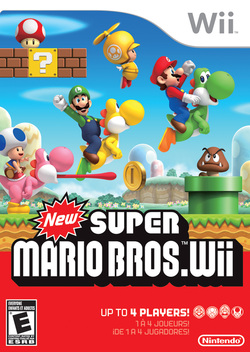 After such an amazing, awe-inspiring game like Super Mario Galaxy, Nintendo put it's self and the developers of the Mario games into quite a pickle. On one hand, they completely exceeded everyone's expectations for what a 3D Mario game on the Wii console could be, and they should be commemorated and congratulated for that tenfold. What they pulled off with that title is nothing short of amazing, and thankfully, the critics around the world universally agreed how amazing it was, thus rewarding the team for their accomplishments with the game. On the other hand, however, they raised the bar so high for themselves for any future Mario games, it almost seemed impossible for any Mario game to get better, or even equal, of what Galaxy accomplished. So when they announced New Super Mario Bros. Wii as the next Mario title, which wasn't a follow up or successor to Galaxy at all, fans everywhere balked at the news and immediately started judging the game for not being as good or as creative as Galaxy. Gamers seemed to adore Galaxy so much, that no matter what Nintendo revealed, it wasn't going to be enough to satisfy the craving that Nintendo themselves established in the first place. It felt like a no-win situation for the company, and the criticism and negativity started right back up. The thing is, however, that Nintendo never claimed to want to make another Galaxy game, or a game similar to it. Remember, they like to shake things up, keep things creative and new and fresh feeling, and not dwell too heavily on one style of gameplay, despite how successful it might be, I mean think about it, how often does Nintendo put out back to back Mario games of the similar style? Exactly. Yet everyone, even to this day, continues to say that Nintendo just recycles the same old, tired formula over and over again. Weird how perspective and assumptions can differ so greatly from reality some times. Anyway, with New Super Mario Bros. Wii, they went back to the successful formula that the DS game established, providing the classic 2D side-scrolling gameplay in a very stylish, modern style of design. With Galaxy, the clear focus was on adventure and 3D exploration of the worlds traveled to, and while it was an amazing experience from start to finish, I can totally see why it isn't a game for everyone. Remember that the Wii was a household staple all across the country, and not just in the living rooms or bedrooms of "hardcore" gamers. The install base had branched out into casual and first-time gamers, and for those not used to controlling video game characters around a 3D axis, it could surely prove to be difficult without the proper hand-eye coordination or years of practice. And just because Galaxy was so successful didn't mean that Nintendo would be complacent and just be satisfied with Mario reaching out to some of their customers, but not all. With that idea in mind, New Super Mario Bros. Wii was born, hoping to reach out to that audience that was turned off by the complex game play of Galaxy. NSMBW was developed with families in mind, hoping to bring everyone together on the couch for game play sessions in a Mario co-op experience like no other. At first, it's easy to label Mario as a family game, but in reality, no Mario game was ever truly developed with multiple gamers in mind. Sure, they would have a second player option in some of them, allowing two players to take turns playing levels, which are really just two individual gaming experiences, instead of one shared experience. With this game, however, they wanted to change all that, and allow four players at once to share one gaming experience, however hectic it may be. And when thinking about this game, my first memories are always how chaotic and hectic it was playing with my three kids. We would sit around and play it together, because we could, and because they loved it. Sure, it was as frustrating as you could imagine for a gamer like me, but when you sit back and just experience the game as nothing but fun times with your kids and not worry about collecting everything, or doing the best as possible, it really is a blast. It's pure madness, but it's fun nonetheless. Playing with my daughter on this Christmas day afternoon, all I could think about was all those times I got to play it with them, and how I may have taken that time for granted. Hindsight is dangerous if you let it get to you, but I wish I could go back and appreciate all those moments I had with my kids while playing games, especially now that my time with them is far more limited, especially for playing games with them. I remember the younger ones always "bubbling up" on the tough parts of each level, which just encapsulated their character in a bubble that would follow the other players through the level, until popped. This prevented them from dying or getting stuck on jumps they couldn't make, and really made the game playable for everyone of all ages. It prevented frustration from my end, and it kept them entertained and in the game without worry of them getting bored due to difficulties. It's not the best looking Nintendo game, or the most creative. It's not the most ground breaking game, or at the top of the list within the franchise. But it will always be remembered and appreciated for opening doors to everyone who wanted to experience a Mario game, that wasn't just satisfied watching or playing as a second player, alone. It brought people together on the couch for a full game experience, and while online gaming was climbing higher and higher in popularity, it was refreshing to see a company still value in-person human interaction. Of course, maybe it was this game that made Nintendo remember that loneliness is tough thing to handle, even for video game characters. I mean, space is a pretty lonely place if you don't have a companion by your side, don't you think? 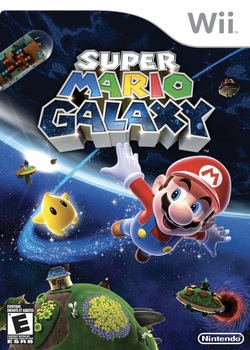 When the Nintendo Wii was released, everyone flocked to it and wanted to get their hands on it to try out the new motion controllers and see this crazy new Nintendo console that was sweeping the country. Gamers high and low wanted to see what this game system was all about, and why it was reaching out to such a broad audience and consumer base like not video game system ever before had done, as people who had never picked up a game controller, much less liked video games, were clamoring for the Wii. Needless to say, it was a transcendent fixture in gaming history, reaching out and bringing a wide range of people together for the sake of video games. Once the shine and mass hysteria wore off a bit, through, the true gaming audience began to sit back and pick the system apart, pointing out all the things perceived to be wrong with it as an attempt to knock it back a peg or two, in hopes of fighting the good fight for one of the other systems, Xbox 360 or PS3. The thing is, Nintendo never set out to create a machine like Sony or Microsoft. They wanted to develop something that would bring people together, encourage family time and overall just give players the ability to have fun, without the stress and pressure of online gaming or competitive fanboyisms. Because of this route, however, Nintendo did deliver a system that was technically under-powered compared to the "competition," and many games that were released for the system looked and played like hot garbage, as they were merely attempts to be cash cows and take advantage of the over saturated market and create cheap, gimmicky motion controlled games to trick the average consumers who were new to the marketplace to giving them money, hoping they wouldn't notice the difference between quality games and "shovelware" games. These shovelware games completely ruined the imagine for Nintendo among the "hardcore" fans, and they constantly used the poor quality and horrible graphics as proof of how under-powered the Wii was in the current landscape of games. Nintendo never really stood up and stopped the flow of crappy games from hitting store shelves, all but making the "Nintendo Seal of Quality" from back in the day meaningless now. Despite Nintendo taking a quiet stance on what third party games were being released for their system, they finally took a stand against people criticizing them and their "little system that could." They finally proved, once and for all, exactly what the Wii was capable of from a graphics and technical standpoint, when they released the mind-blowing, incredible Mario game known as Super Mario Galaxy. When this game was announced and shown off for the first time, people were blown away. Mario is space? At first, the notion seemed crazy, but in actuality, having the freedom of space actually allowed the franchise to open up and grow, giving the developers a chance to try new and creative ideas that just wouldn't or couldn't work in the already established Mario universe. Possibilities are endless up in space, and because of that, Mario was set free to explore levels and worlds like never before. The game physics are intense and always changing, from planet to planet, which keeps the game and the idea of being in space from ever feeling repetitive or boring. You're able to control Mario in ways you had only dreamed of before, and in some circumstances, ways you couldn't have dreamed up in a million years. Bee Suit Mario, anyone? The way that Galaxy plays was refreshing and fun, never feeling like a gimmick. Game play was a huge part of Galaxy, but whenever the game is brought up and I'm forced to think about it, I always revert back to just how gorgeous this game is. I understand that so many games these days, especially for the new systems, are gorgeous and great looking, but what Nintendo did with Mario Galaxy were things hardly ever seen in games, especially Nintendo games, even more especially, Mario games. Most of the beauty doesn't come from the big, fantastic looking worlds, planets and moons, ore the enemies that inhabit them, but rather the smaller details in the game. The shimmer of far off galaxies and stars, the space dust left behind in trails as you fly through space, the delicate touches of texture on things you're not used to seeing texture on. I could gush for thousands and thousands of words about how amazing this game looks, but really, I could never do it justice. It's so breathtaking when you see it first hand, especially when you look over and see that little machine that no one imagined could do anything remarkable running this game, which received perfect scores left and right by critics, and is still near the top of the list for Metacritic as one of the best, highest rated games of all time. Talk about making a statement, Nintendo. Silence can be powerful when used correctly, I suppose. Just because Nintendo finally took a stand against the nay-sayers, doesn't mean they would change their ways completely, as keeping the industry guessing and catching them off guard is something they will always do, I would bet. Their follow up to Galaxy is not eh 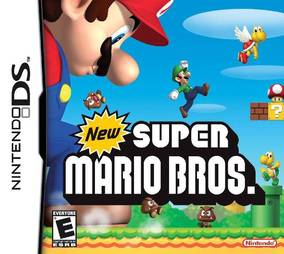 Handheld gaming has always been something of a novelty for me, personally. As a kid, sure, I had a GameBoy, and then a GameBoy Color, but in all honesty, I just never got that into them. I always saw them as something to do when there was nothing else to do, especially when there wasn't an actual game console around to play. I can't ever remember a time where I would choose a a handheld over a console, just because of how much better the consoles were. Aside from Pokemon, of course, I never really felt like handheld games were worth serious chunks of my free time, and always treated them as something I would pick and play for brief moments in time, put them down and not worry or think about them until the next situation I was in that called for something to kill time and boredom. I always appreciated the fact that Mario was prevalent on Nintendo's handheld systems, I just never got into them. I played them, and they were fine for what they were, but I never loved them. For me, they always seemed to be missing something, almost as if there were shells of the full Mario experience. They just weren't Mario as I had come to expect, and for that reason, I don't remember ever obsessing over them as much as I did the more commonly well-known and recognized consoles Mario games. Apparently, my overwhelming sense of apathy towards handheld Mario games was greater than I thought, as New Super Mario Bros. was released for the Nintendo DS, and I had no clue of its existence at the time. To be fair, however, I didn't even own a DS personally, and if I'm not mistaken, this might have been the only legit Mario game that slipped past my radar while on my gaming hiatus, as it came out as I was slowly crawling out of that dark hole in my life. It wasn't until I got my oldest son a DS Lite and this game for Christmas one year did I really know anything about it, and man, I couldn't have been more impressed by what I played. How could I have neglected this fantastic Mario game for so long? Finally, a good handheld Mario game that could hold its own with some of the best console Mario games, and here I was, in dark for the longest time about it? I actually felt like I had let the entire company, brand and game franchise down as a fan and customer, and questioned my loyalty to the company I so deeply loved. Was I really becoming that jaded as a gamer? Was I finally growing up and past liking Mario games? Was the apathy I held on to for so long finally too strong to overcome and move past? I had no answers at the time, and looking back, I can't really pinpoint anything to be true or false. In the grand scheme of things, however, I did play New Super Mario Bros. with my boy, and later on, my second oldest kid when he was old enough to get his own DSi, so whether or not I knew about or liked the game when it first came out is irrelevant. It's not the journey as much as it is the destination, sometimes. Anyway, going back and playing this game again made me rehash all those weird memories. More importantly, though, is the fact that this game still holds up after all these years. Another thing I noticed was that while the giant and mini mushrooms have been used several times in games since this game, it was still fun going back and experiencing the roots of these cool power-ups. Despite it's critical success, I can't imagine too many people predicted that this format of Mario game - you know, the updated, new age 2D stylized platformer - would go on to be the foundation for many more Mario games to come. Then again, who really could have predicted where Mario's next adventure would take place anyway? 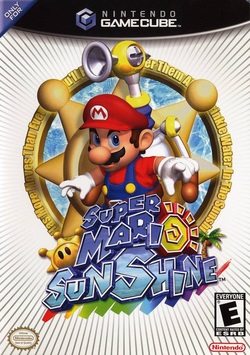 After the year I've had, I can definitely say that I could use a nice, healthy break from gaming. It's not that I don't want to play games for a while, but rather just get back to playing the games I want to play, when I want, how I want, without having to worry about satisfying the requirements for this blog. Not that I haven't enjoyed this blog project thus far, as after this year is up I plan on writing a full write-up about my experience this last year, how I have enjoyed it, what I've learned, etc. Still, though, I could use a break from what I have been doing every year for 356 straight days now, as everything can get tiresome after so long. Just ask Mario. After years of saving the Princess and the entire Mushroom Kingdom over and over again, non-stop, even his job got tedious and tiresome. Being Mario isn't easy, you know, and every so often, the plumber just needs to take a break and go on vacation. Sure, Mario is a fictional character, in a fictional universe within a video game, but regardless, developers never show the behind the curtain of these fictional worlds. Well, for Mario's one and only outing on the Nintendo GameCube, he finally took his long awaited and much needed vacation, not just from his every day life, but from certain things that Mario games, Mario games. Super Mario Sunshine is the game that took Mario on vacation, and threw conventional wisdom out the window while doing so, implementing ideas and mechanics never to be seen again. Right off the bat at the start of the game, you know it's not going to be like any other Mario game you've played. For one, seeing Mario kicked back, relaxing on the beach is a new sight to behold, that's for sure. Once you get going though, you are armed with a backpack water gun, an unusual thing for Mario to tote around, as he normally isn't one to pack around gadgets and equipment to get the job done. In this game, though, his job isn't quite like other games, as he is tasked with the dubious task of cleaning off paint that has covered the tropical island, eerily similar to an oil spill. This oil-like paint is making everything on the island wacky and different, taking over harmless creatures and turning them into enemies of Mario and quite simply, putting a damper on the vacation Mario was trying to have. In his pursuit to clean the island and save the day, he is also searching for magical little sprites, that add sunshine to world and make everything nice and bright. Oh, and there are also a couple of new enemies for Mario to go head-to-head with, one of which is Bowser Jr. who is more maniacal than his pops. There is also Shadow Mario, who is just there to reek havoc and slow you down. The game takes place entirely on the tropical island and surrounding areas of it, with you playing levels and areas within the island world. All the different locals are fun to explore, as you've never ran Mario around a marine harbor or an abandoned, haunted seaside hotel on the beach. There are residents on the island to interactive with also, who aren't mushroom men, and as characters, they are an enjoyable change of pace. In fact, everything about the game is a nice change of pace, which is why I love this game so much. Not everybody likes this version of Mario, however. They complain that it's too different from the typical Mario platforming game, and that the water jet pack is just weird in a Mario game. Sure, the camera in this game can get cumbersome at grueling to manage at times, but once you get past that fact, the gameplay remains as fun as any other 3D Mario platformer, before or after. I love the idea of having to clean stuff, and constantly having to find bodies of water to refill the tank of the water pack. I like being able to hover with the powerful stream of water, and finding shine sprites throughout the world. Basically, I like that it is different while still keeping certain aspects of traditional Mario games in tact. While I wish that F.L.U.D.D. (the water pack) would make its way back into a Mario game at some time, and Mario would return to his vacation island for another adventure, I also fully appreciate that Super Mario Sunshine is a one of a kind Mario game, and will always hold a place within the franchise as being such a unique title. And after such a big, unique adventure, it's only fitting that the next adventure for Mario would bring him back to familiar places, and bring him back down to size in scale and context, but not necessarily size. |
Details
Gamer Tags
XBLA = The Noyse
PSN = the_noyse NNID = The Noyse 3DS F.C. = 3007-8109-2329 STEAM = TheNoyse FEEL FREE TO FRIEND ME! Stats
Games played for project : 365 Archives
February 2014
Categories
All
|

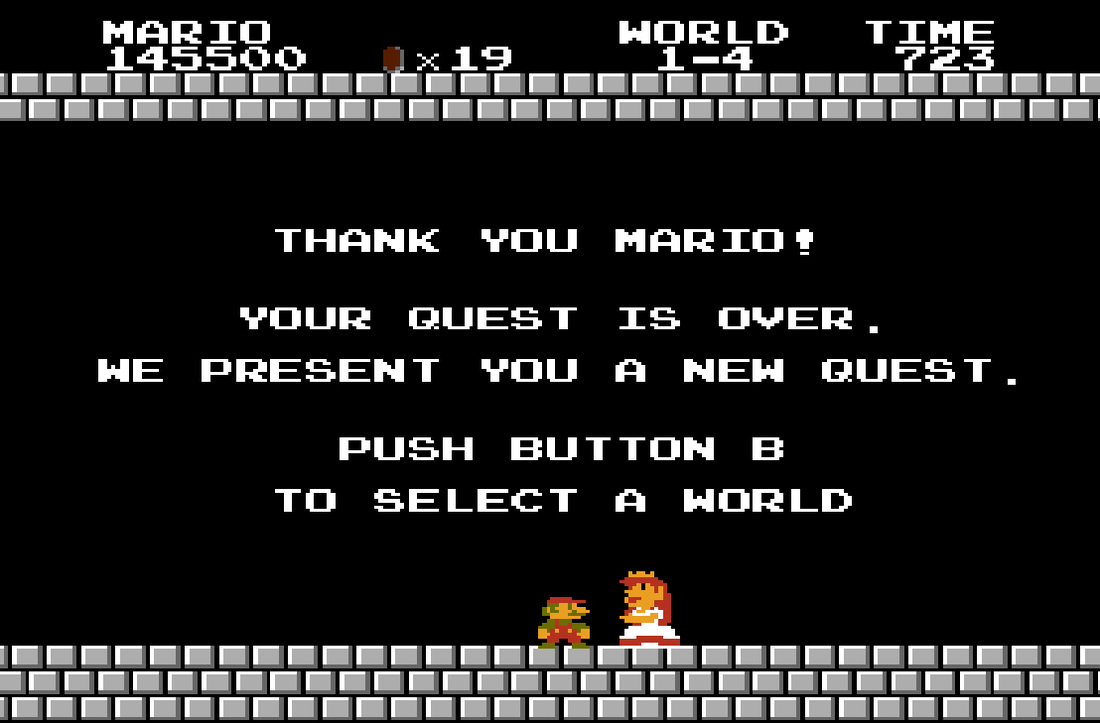









 RSS Feed
RSS Feed
